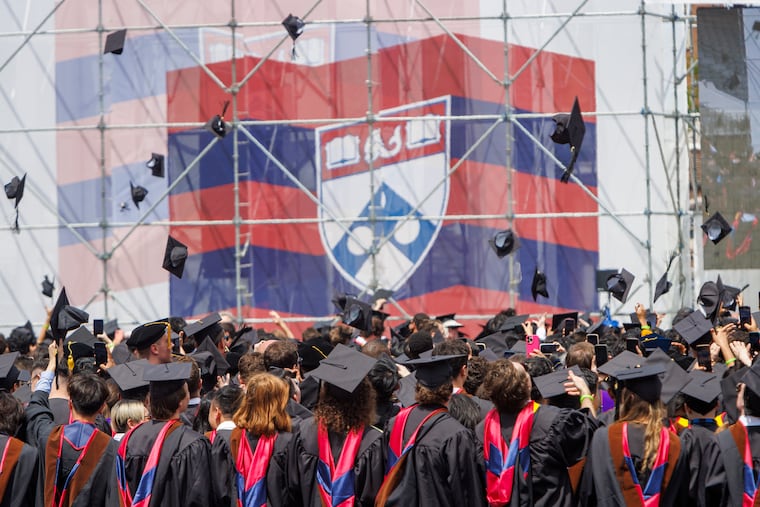The biggest problem at Penn is matching what we say about student careers with what we do
Half of our undergraduates enter the fields of consulting or finance. Penn talks the talk of public service, then teaches young people to line their pockets.

When I was in fourth grade, the teacher had us go around the room and say what we wanted to be when we grew up. Some kids wanted to be baseball players or firemen; others said they’d be nurses or doctors.
But I was always different. When it was my turn, I said I wanted to be a management consultant. And if that didn’t pan out, I added, I’d go into finance.
Just kidding.
Nobody wants to work in consulting or finance when they’re a kid. And nobody — well, almost nobody — goes to college imagining that’s what they’ll do.
But at the University of Pennsylvania, where I teach, half of our undergraduates enter one of those two fields when they leave here. On the first day of college, we tell them to find their passion and change the world. Then we socialize them into consulting and finance, which are unlikely to satisfy either goal.
And the students know it, too. Despite what you might have read, the biggest problem at Penn isn’t political correctness, antisemitism, or racism. It’s cynicism, sparked by the huge chasm between what we say and what we do.
I thought about this divide while reading the recent report by our Presidential Commission on Countering Hate and Building Community, which was appointed last fall after the Oct. 7 attack on Israel and the subsequent war in Gaza. As the report notes, these events sparked protests, accusations of hate speech, and “widespread concern for the well-being and cohesion of the Penn community.”
In response, the commission said Penn should bring people together by doubling down on its core values: inquiry, engagement, and public service. Here it drew upon the university’s founder, Ben Franklin, who famously declared, “The noblest question in the world is, what good may I do in it?”
I endorse that vision, and I applaud the commission for articulating it. But if you listen to our students, you hear something else: Penn talks the talk of public service, then teaches young people to line their pockets.
Freshman Niheer Patel arrived on campus last fall eager to meet “passionate kids” who wanted to “make their mark on the world.” But, as he wrote in the student newspaper, Penn channels this curiosity and talent into a narrow band of uninspiring — but highly compensated — occupations.
As soon as students get here, Patel wrote, they encounter a dense network of consulting clubs that seduce them with promises of riches down the road. And the university reinforces that dream, he added, by giving consulting and finance firms pride of place at career fairs.
You see your peers get dressed up, get interviewed, and get jobs. And then you do the same thing, even though it doesn’t ignite your passion — or improve the planet.
“These careers do not excite the vast majority of students,” Patel wrote. “We are killing the things that bring us joy (and good to the world) in the pursuit of the false god that is absurd wealth.”
Maybe that’s why so many students are anxious or depressed. They’ve been on a treadmill since middle school, designed to get them into a prestigious college. Their reward is yet another treadmill, to get them a prestigious job.
We see the same phenomenon at Harvard, where students speak — without shame — about taking “sellout jobs” in finance or consulting after graduation. To square that with their progressive bona fides, some of them imagine they can sock away a few million, and then do what they really want to do: change the world
But the more likely scenario is that the job will change them into someone who is quite comfortable with the world as it is. “You spend 15 years at a hedge fund, you’re going to be a different person,” Harvard professor Mihir Desai warned.
So here’s the real question: What kind of people do we want Penn students to be?
What kind of people do we want Penn students to be?
If we really sought to make good on Franklin’s vision, we would stop on-campus recruiting by the big consulting and finance firms; they can do that elsewhere and on their own dime. And we’d restructure career fairs around social work, teaching, and other service professions.
I know that might be a hard sell to cash-strapped students, especially those who go into debt to pay our giant tuition bills. But, as a survey of Harvard seniors showed, first-generation and working-class students were no more (or less) likely than their well-heeled peers to take sellout jobs after college. This isn’t just about economics, it’s about our campus culture, which teaches people to mouth the pieties of social justice while they march off to Wall Street.
As protests engulfed colleges after Oct. 7, conservatives charged that elite universities and their radical professors had turned students into “Marxists.” If half of my students are going into finance or consulting, I must be one sorry excuse for a Marxist. Our students aren’t becoming radicals; they’re becoming cynics. And that’s on us.
Jonathan Zimmerman teaches education and history at the University of Pennsylvania. He is the author of “Free Speech: And Why You Should Give a Damn” (with illustrations by cartoonist Signe Wilkinson) and eight other books.